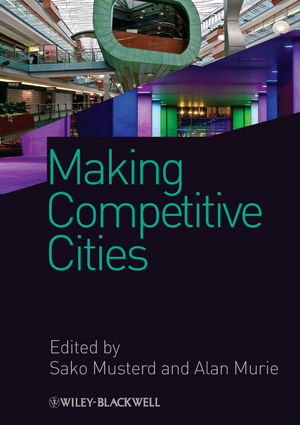Making Competitive CitiesISBN: 978-1-4051-9415-0
Hardcover
376 pages
June 2010, Wiley-Blackwell
 This is a Print-on-Demand title. It will be printed specifically to fill your order. Please allow an additional 10-15 days delivery time. The book is not returnable.
|
||||||
Preface
Contributors
PART I INTRODUCTION
1 Making Competitive Cities: Debates and Challenges
Sako Musterd and Alan Murie
Debates and challenges
Sectors
Questions and theories
Regions and sources
Pathways, actors and policies
References
2 The Idea of the Creative or Knowledge-Based City
Sako Musterd and Alan Murie
Essential conditions for competitive cities
‘Hard’ conditions theory
Cluster theory
Personal networks
‘Soft’ conditions theory
Three parts
References
PART II PATHWAYS
3 Pathways in Europe
Denis Eckert, Alan Murie and Sako Musterd
Path dependency
Initial expectations and comparisons
The chapters to come
References
4 Stable Trajectories Towards the Creative Knowledge City?
Amsterdam, Munich and Milan
Anne von Streit, Marco Bontje and Elena dell’Agnese
Introduction
The economic base and the creative knowledge economy
Development path: roots and current conditions of the
creative knowledge economy
Development paths: a synthesis and conclusion
References
5 Reinventing the City: Barcelona, Birmingham and Dublin
Veronica Crossa, Montserrat Pareja-Eastaway and
Austin Barber
Introduction
Historical context
The trajectory of industrial development
The state and policy intervention
The challenge of soft factors
Conclusions
References
6 Institutional Change and New Development Paths:
Budapest, Leipzig, Poznan, Riga and Sofia
Tadeusz Stryjakiewicz, Joachim Burdack and
Tamás Egedy
Introduction
Socio-economic characteristics of the study areas
Development pathways shaping the city profiles and the role of the systemic change
Determinants of development of the creative knowledge sector
Conclusions
Acknowledgements
References
7 Changing Specialisations and Single Sector Dominance:
Helsinki and Toulouse
Hélène Martin-Brelot and Kaisa Kepsu
Introduction
Setting the context – Helsinki and Toulouse
Pathways to knowledge-driven economies
Knowledge driving economic development: sciences, industries and policies
Future challenges
Conclusion and discussion
References
PART III ACTORS
8 What Works for Managers and Highly Educated Workers
in Creative Knowledge Industries?
Sako Musterd and Alan Murie
Introduction
Three groups of actors and a range of conditions
The following chapters
References
9 Managers and Entrepreneurs in Creative and Knowledge-
Intensive Industries: What Determines Their Location?
Toulouse, Helsinki, Budapest, Riga and Sofia
Evgenii Dainov and Arnis Sauka
Introduction: places matter
Cities and the creative class: major conceptual challenges
Characteristics of the cities: a brief overview
Location decisions: ‘individual trajectory’ considerations and ‘hard’ factors
Location decisions: the role of ‘soft’ factors
In-city location decisions
Capital city versus provincial city location decisions
Policymaking: ‘soft’, ‘hard’ or ‘other’?
Conclusions and implications
Acknowledgement
References
10 Transnational Migrants in the Creative Knowledge Industries:
Amsterdam, Barcelona, Dublin and Munich
Heike Pethe, Sabine Hafner and Philip Lawton
Introduction
Conceptualising transnational migrants and the
creative class
Places and potentials
The attractiveness of European metropolitan regions
Conclusion
Acknowledgments
References
11 Attracting Young and High-Skilled Workers: Amsterdam,
Milan and Barcelona
Montserrat Pareja-Eastaway, Marco Bontje and
Marianne d’Ovidio
Introduction
Competing for young, highly skilled workers
Young and highly-skilled workers in European cities
The Amsterdam, Barcelona and Milan city-regions
Conclusions
References
12 Working on the Edge? Creative Jobs in Birmingham,
Leipzig and Poznan
Julie Brown, Robert Nadler and Michal Meczynski
Introduction: creative work – precariousness, uncertainty
and risk?
Methodology
Insecure, casualised or long-term, sustainable employment?
Discussion
Conclusions
References
PART IV POLICIES
13 What Policies Should Cities Adopt?
Alan Murie and Sako Musterd
Introduction
What should cities do?
European cities
Which policy agendas?
Networking policy
The following chapters
References
14 Strategic Economic Policy: Milan, Dublin and Toulouse
Silvia Mugnano, Enda Murphy and Hélène Martin-Brelot
Introduction
Distinctive policy traditions
Existing strengths in creative knowledge policy
New strategic economic policy approaches
Key actors in entrepreneurial cities
Addressing barriers and obstacles
Conclusion and new challenges
References
15 Beyond Cluster Policy? Birmingham, Poznan and Helsinki
Caroline Chapain, Krzysztof Stachowiak and
Mari Vaattovaarra
Introduction
The cluster policy paradigm
The state of the creative and knowledge economy
Supporting the creative and knowledge economy: three approaches
Conclusions
Acknowledgments
References
16 Policies for Firms or Policies for Individuals? Amsterdam, Munich and Budapest
Zoltán Kovács, Heike Pethe and Manfred Miosga
Introduction
Do policies help in competition? – a theoretical framework
Economic development and political conditions
The creative and knowledge sector and policies enhancing its development
Conclusions
References
17 New Governance, New Geographic Scales,
New Institutional Settings
Bastian Lange, Marc Pradel i Miquel and Vassil Garnizov
Introduction
Conceptual prerequisites: understanding governance in creative and knowledge industries
New governance dimensions
Professionalisation – self-regulation and self-governance of new professions
Towards new geographical scales?
Governance approaches in Barcelona, Leipzig and Sofia
Knowledge-intensive industries in regard to governance perspectives
Conclusions
Acknowledgements
References
PART V SYNTHESIS
18 Synthesis: Re-making the Competitive City
Sako Musterd and Alan Murie
Introduction
A city is not a T-shirt
Multi-layered cities: the importance of pathways
Personal actor networks: key conditions
New governance approaches
Conclusion
References
Index



